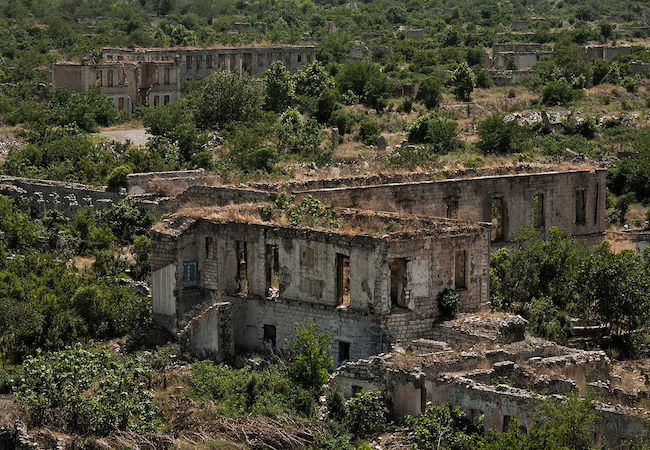The emergence of dissent within Armenia under the leadership of former President Robert Kocharyan has pushed Prime Minister Nikol Pashinyan to pick up the pace in visiting Azerbaijan's Nagorno-Karabakh region, which Armenia has been keeping under its occupation since the early 1990s.
Kocharyan carries a lot of clout in the Nagorno-Karabakh region and that is pushing Pashinyan to make more frequent trips there, which sometimes come off as hasty and unscripted.
“Kocharyan is disliked in Armenia; however, he has great authority among the separatist regime in the occupied Nagorno-Karabakh region,” Elkhan Shahinoglu, the head of the Atlas Research Center in Baku, told Caspian News.
According to Shahinoglu, Pashinyan’s third visit to the Nagorno-Karabakh region that took place last Saturday indicate his anxiety over a loss of influence and authority there – and his worries are not exactly unwarranted.
“Kocharyan is teaming up with his former brother-in-arms and ally, his presidential successor, Serzh Sargsyan, against Pashinyan. Sargsyan’s returning to Karabakh, following a post-abdication vacation in early August, proves he also has strong support in the region,” Shahinoglu said while explaining the possibility of Kocharyan launching a strong opposition to Pashinyan from the region.
Robert Kocharyan served as Armenia’s second president, from 1998-2008, and was succeeded by Serzh Sargsyan, who served until this past April. Both Kocharyan and Sargsyan were born in the Nagorno-Karabakh region of Azerbaijan, namely in the city of Khankendi.
Nikol Pashinyan, the 16th and current prime minister of Armenia, does not share the same roots, having been born in Ijevan town in the far northeastern Tavush region of Armenia.
“Pashinyan has been warned to beware of a Kocharyan-Sargsyan revolt against him in Karabakh,” Shahinoglu said, using the shorthand name for a region of Azerbaijan that has staged years of war between the two post-Soviet countries of Armenia and Azerbaijan. “With trips to the region, he is trying to convince the separatist regime not to create an alliance with Kocharyan.”
Relations between Pashinyan and Kocharyan spiraled down on July 27, when Kocharyan was arrested by the Yerevan City Court of General Jurisdiction over a decade-old grievance. Charges against him were based on the claims of attempting to overthrow the constitutional order during events in March 2008 following the presidential elections, which resulted in eight civilians and two policemen being killed.
On August 13, Armenia's Court of Appeals released Kocharyan on bail. Government investigators and Pashinyan both objected to the decision, saying Kocharyan should not have immunity from prosecution.
Rumors have circulated in Armenia that Kocharyan is preparing to fight against Pashinyan by buying up local television channels.
Kocharyan was a field commander that fought against Azerbaijan during the bloody war in Azerbaijan’s Nagorno-Karabakh region that broke out shortly after the dissolution of the Soviet Union, and lasted from 1991 to 1994. When he rose to power as president of Armenia in 1998, he appointed his comrade-in-arms Serzh Sargsyan – also from the Nagorno-Karabakh region – as his defense minister. The two became the face of what has been dubbed “the Karabakh clan” both by some local and international circles.
Pashinyan’s government started hunting down what it believed to be injustices committed by Kocharyan and Sargsyan during their consecutive reigns, including corruption and other problems faced by Armenians over the last two decades from 1998 to 2018.
“Tensions between Pashinyan and Kocharyan can grow on in the near future until the parliamentary elections in May 2019,” Shahinoglu told Caspian News. “As the situation becomes more strained, it may turn into a civil war.”







 The Mine Action Agency of Azerbaijan (ANAMA) reported on Thursday the discovery of a significant amount of explosives in the Khojavand district of ...
The Mine Action Agency of Azerbaijan (ANAMA) reported on Thursday the discovery of a significant amount of explosives in the Khojavand district of ...
 Iran’s Foreign Minister, Hossein Amir-Abdollahian, has labeled a foiled Israeli drone attack in certain parts of the country as a "failure" for Isr...
Iran’s Foreign Minister, Hossein Amir-Abdollahian, has labeled a foiled Israeli drone attack in certain parts of the country as a "failure" for Isr...
 Iran has refuted reports of alleged damage to Shimon Peres Negev Nuclear Research Centre located southeast of Dimona, Israel, during the recent air...
Iran has refuted reports of alleged damage to Shimon Peres Negev Nuclear Research Centre located southeast of Dimona, Israel, during the recent air...



